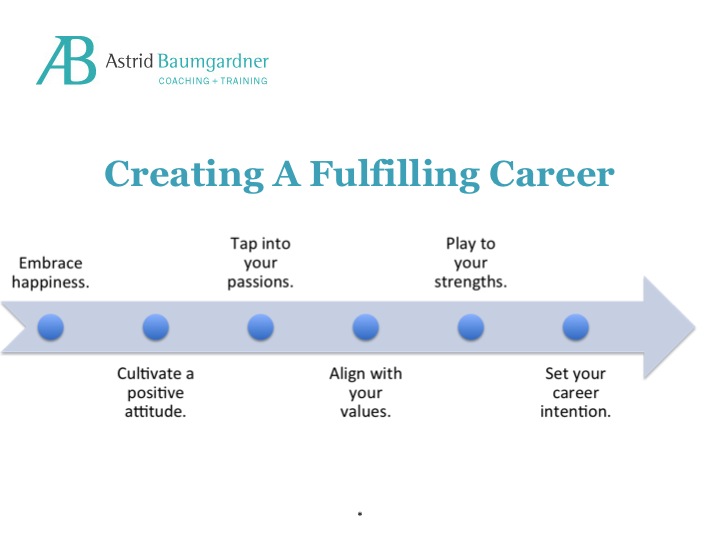In my work with arts leaders, I emphasize the importance of networking and therefore consider networking to be an essential leadership skill. My definition of networking is very simple: Connect + Share + Remain Relevant This boils down to the art of creating successful relationships in a mutually-supportive community that can help you both personally and professionally, as well as …
How To Adopt the Attitude of Success Part II: Raise Your Energy in 7 Steps
My last blog post on how to adopt the attitude of success introduced the 6 different levels of energy– the different attitudes that you might have about your career– showing the thought that is associated with each level: Stress-Inducing Levels: Level 1: Worried Level 2: Frustrated Motivating Levels: Level 3: Managing Level 4: Service Level 5: Opportunity Level 6: Flow Here …
Top Picks from My Bookshelf: Inspiration on How To Create Success
As an inveterate life-long learner, I constantly read in order to get new ideas and refresh my learning. I still love books: e-books for convenience, hardback and paperbacks for marking up and filling with notes! And I love to share my resources with friends, colleagues, clients and students. If you are an arts entrepreneur or leader looking for some new inspiration …
How to Achieve Your Big Goals: Challenge Your Assumptions through SMART Life Experiments
Think about the last time you set a big, transformational goal for yourself. Maybe it was to change careers, feel more confident in your work or assume a leadership position in your organization. Thinking big is a hallmark of entrepreneurship so you have undoubtedly done this! For some people, it’s a matter of setting the goal, breaking it down into …
Public Speaking for Musicians: Hook Your Audience by Telling Your Story
Yesterday, I had the privilege of presenting a webinar at the Chamber Music America First Tuesdays series on Public Speaking for Musicians. I strongly advocate that musicians and arts leaders speak to audiences about music. Indeed, an effective speech can open up new worlds for our audiences by giving them an insight from the perspective of a trained artist on how he or …
Finding Your Passions for Success: Think Expansively To Find Your Sweet Spot
I am a huge advocate of doing what you love and finding passion in your life’s work. Passion is at the heart of entrepreneurship. Not only is it incredibly motivating to have your work reflect what you love but chances are that you will be more successful if you are able to able to find happiness in your life, including …
The Elements of Career Success: 6 Steps towards Fulfillment
What are the common elements in creating a successful and fulfilling career? This question is at the heart of my work with professional musicians and arts leaders, as well as creative business professionals—in short, anyone who is committed to incorporating her passions into her work. Here are the 6 steps to creating a career that is not only fulfilling but …
Powerful Questioning: A Key to Effective Communication for Today’s Music Entrepreneurs and Arts Leaders
Over the course of a week, think of all the situations where musicians and arts leaders different situations ask questions: To gather information To get to know someone else better in a networking or in an interpersonal situation To solve problems and clear up potential conflicts with collaborators or colleagues Asking questions is the most basic form of communication, designed …
Top 10 Tips Time Management Tips for Music Entrepreneurs
This year, one of my biggest discoveries was Quadrant 2 time management, the strategy that has you focusing on what is really important to you as opposed to what is urgent, and realigning your time to honor and commit to Quadrant 2 activities each week (for more on this, see tips 2 and 3 below). Q2 time management is helping …
Emotional Intelligence for Today’s Leaders Part I: Self-Awareness
Lately, there has been a lot of press about the importance of emotional intelligence for successful entrepreneurs and leaders.
- Recent reports indicate that applicants to Yale’s School of Management will be tested on their emotional intelligence.
- An entrepreneur and investor with a Harvard MBA published an article in Forbes magazine about the importance of getting an “emotional education” in addition to a traditional education.
- Daniel Goleman, author of the groundbreaking book Emotional Intelligence, posted an article on LinkedIn with 9 different questions to help you evaluate your own emotional intelligence.
So what is emotional intelligence and why should leaders cultivate this skill?
Emotional Intelligence (know as “EQ”, as opposed to “IQ”) is the ability to recognize and control your emotions and then pick up on the emotions of those with whom you are interacting in order to influence and work effectively with them. It’s the ability to express the appropriate emotions at the appropriate time.
This psychological model was introduced in 1990 by Peter Salovey and John D. Mayer and popularized by science writer Daniel Goleman in his groundbreaking work, Emotional Intelligence (1995). Emotional Intelligence has been called ” a revolutionary, paradigm-shattering idea” (Harvard Business Review) since it is strongly correlated with success.
Having high EQ is the way to get buy-in from the people with whom you are dealing and get them to listen, be engaged and inspired to follow your lead. Research has shown that having high EQ is a better indicator of success than having a high IQ. That is why it is such an important leadership skill The great thing about EQ is that it is a skill set that you can develop to make you a more effective leader. Let’s take a closer look.
EQ involves four underlying sets of skills, two having to do with your own emotions and two having to do with the emotions of those around you:






